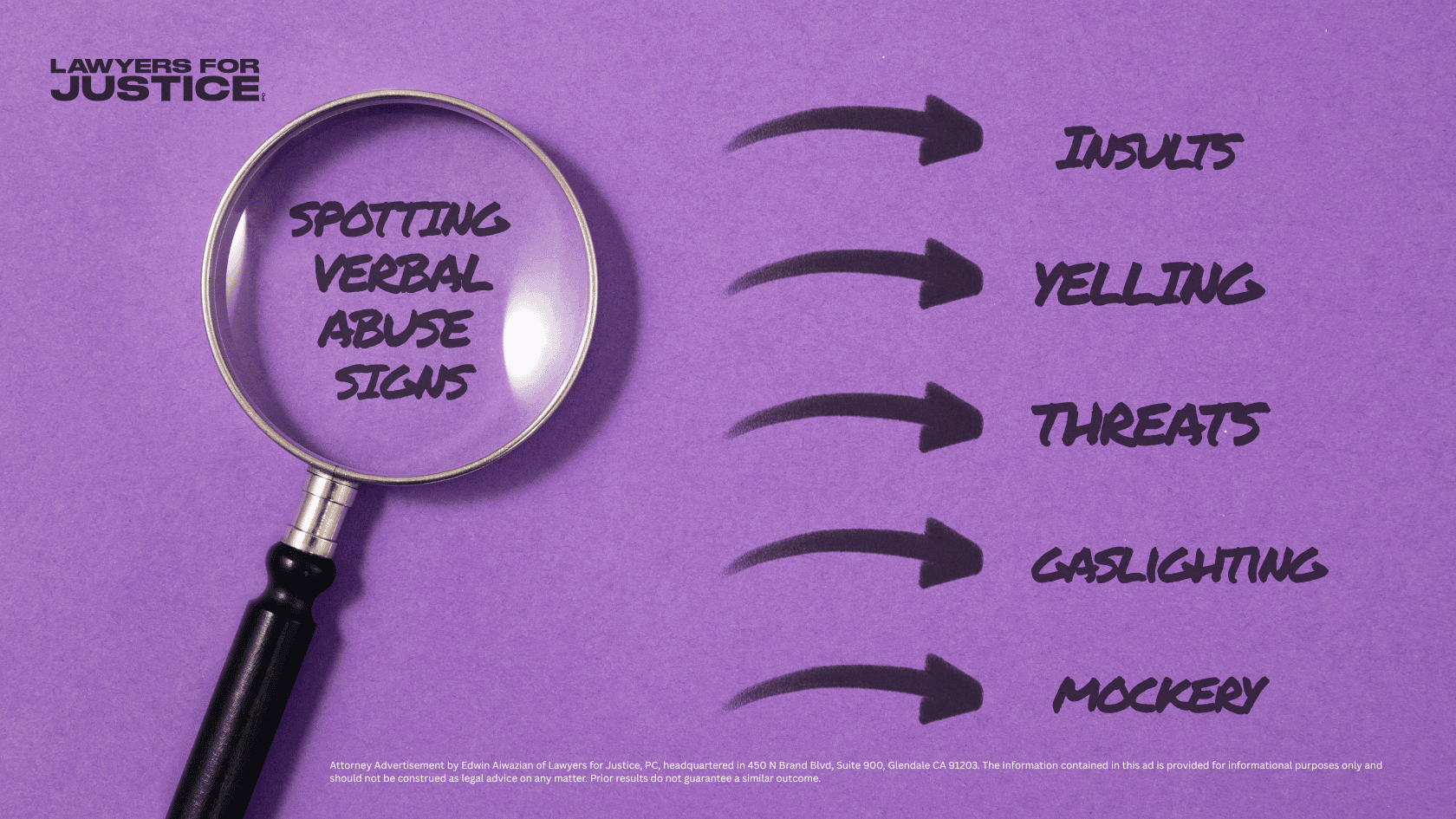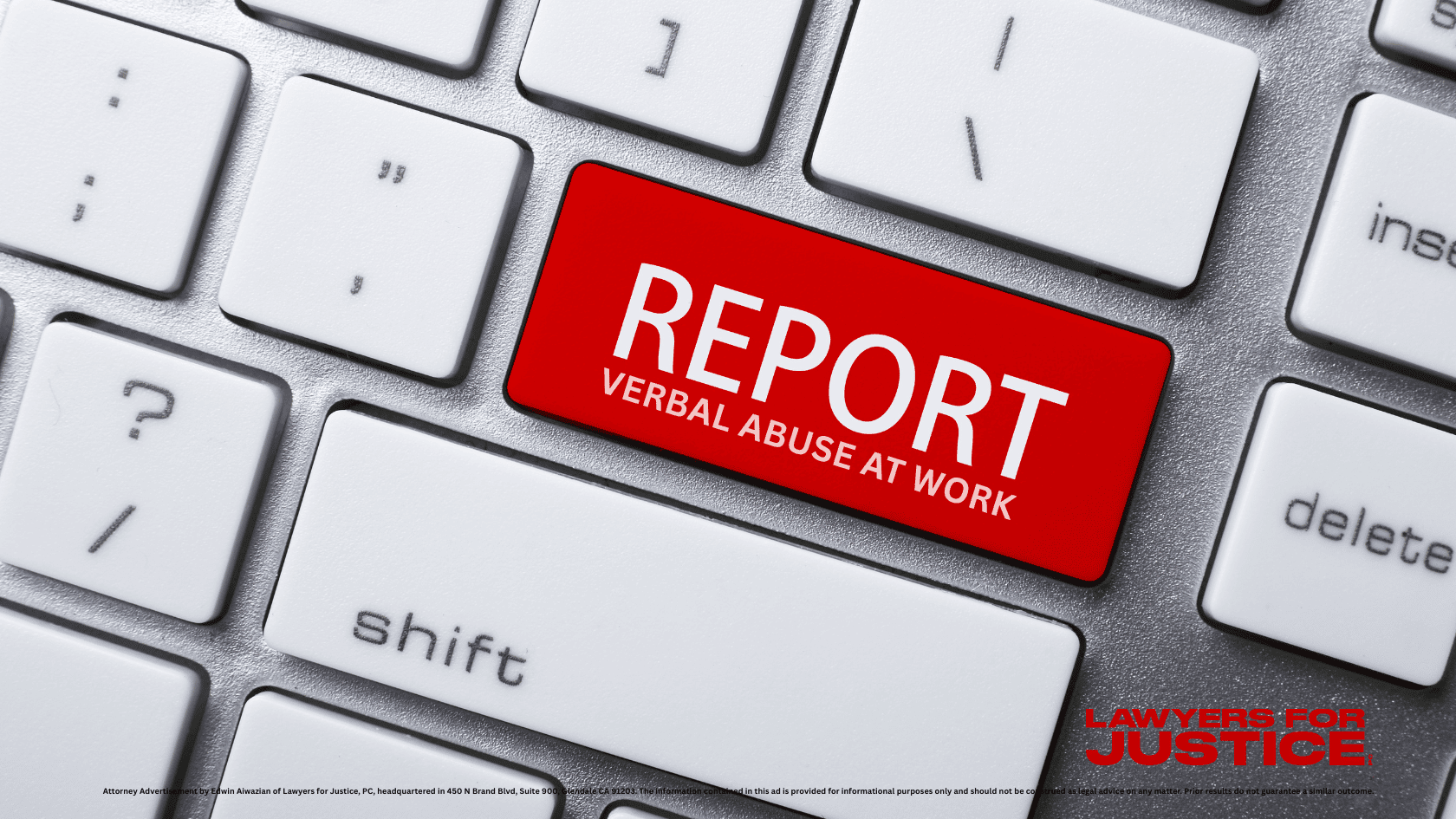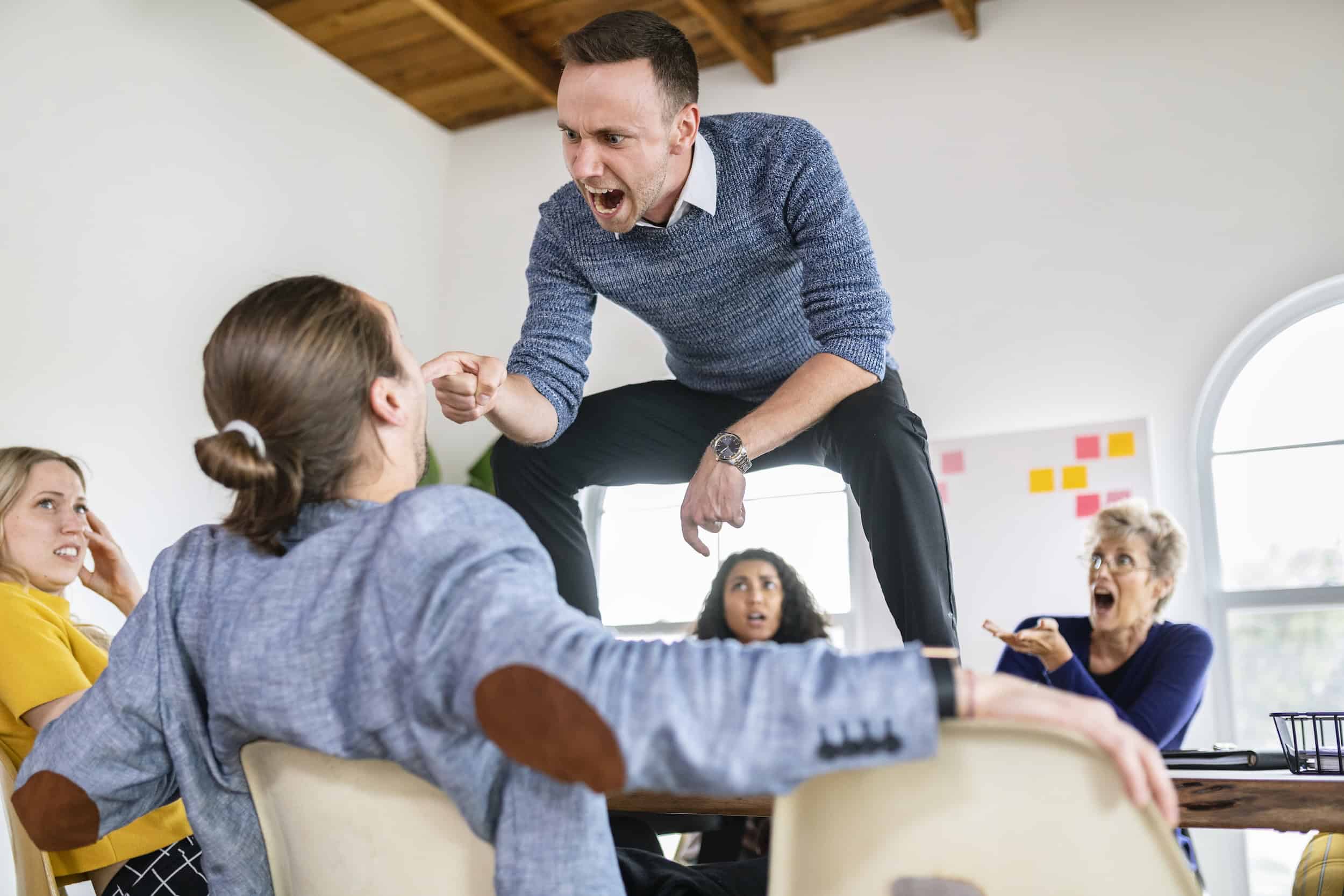Attorney advertisement by Edwin Aiwazian of Lawyers for Justice, P.C., headquartered at 450 N Brand Blvd, Glendale, CA 91203
In today’s fast-paced work environment, it’s important to recognize the signs of verbal abuse. Many people may not realize they are experiencing it, but it can have serious impacts on one’s mental health and job performance. Identifying and addressing verbal abuse is crucial to maintaining a healthy and productive workplace.
Verbal abuse is a form of emotional abuse where someone uses words to control, intimidate, or belittle another person. This can happen in any relationship, including at work. It’s not always obvious, but it can create a toxic work environment and lead to serious consequences for the victim.
Verbal abuse in the workplace often involves a complex interplay of power dynamics. Abusers may exploit their position of authority, using verbal tactics to maintain control. Understanding these dynamics can help in recognizing the patterns and addressing them effectively.
A core component of verbal abuse is emotional manipulation, where the abuser uses words to distort the victim’s reality. This can include exaggerating issues, twisting facts, or playing the victim themselves. Recognizing these manipulative tactics is the first step towards addressing the abuse.
While some verbal abuse is overt and easy to recognize, such as yelling or name-calling, other forms are more subtle. Passive-aggressive comments, backhanded compliments, and sarcasm can all be forms of verbal abuse that are harder to pinpoint but equally damaging over time.
Signs of Verbal Abuse at Work

Recognizing verbal abuse is the first step to addressing it. Here are some common signs to look out for:
1. Insults and Belittling Remarks
One of the most obvious signs of verbal abuse is when someone insults you or makes belittling remarks. This can be done in a joking manner or in a serious tone, but the result is the same. It undermines your confidence and self-worth.
Impact on Self-Esteem
The continuous barrage of insults can erode your self-esteem, making you question your abilities and self-worth. Over time, this can lead to a significant drop in performance and job satisfaction.
Coping with Insults
Finding ways to cope with insults is essential to maintaining your mental health. This could involve seeking support from colleagues or practicing self-affirmation techniques to counteract the negativity.
Recognizing Patterns
It’s important to recognize patterns in the behavior of the abuser. Are the insults directed at you in private or public? Do they occur more frequently under certain circumstances? Recognizing these patterns can help in addressing the issue more effectively.
2. Yelling and Screaming
Raising one’s voice to intimidate or control is another common sign of verbal abuse. If a coworker or boss frequently yells or screams at you, it’s important to acknowledge this as abusive behavior.
Psychological Impact
Being frequently yelled at can lead to heightened anxiety and fear in the workplace. This can create a hostile environment that impacts your ability to concentrate and perform effectively.
De-escalation Techniques
Learning de-escalation techniques can be helpful in managing situations where yelling occurs. Techniques such as remaining calm, not engaging in shouting back, and using neutral language can help defuse the situation.
Seeking Support
If yelling is a frequent occurrence, it’s vital to seek support from HR or a trusted colleague. Documenting these incidents can also be a crucial step in addressing the behavior officially.
3. Threats
Threats can be direct or indirect, but they are always meant to instill fear. A colleague might threaten your job security or imply negative consequences if you don’t comply with their demands.
Understanding the Nature of Threats
Threats often play on your fears and insecurities. Understanding what specific fears the threats are targeting can help you build resilience against them.
Legal Implications
Some threats may have legal implications, especially if they involve harassment or discrimination. Knowing your rights and the legal resources available can empower you to take appropriate action.
Building a Support Network
Having a support network can be invaluable when dealing with threats. Colleagues who witness the behavior can corroborate your experiences, strengthening your case if you decide to report the abuse.
4. Constant Criticism
While constructive criticism is part of a healthy work environment, constant, unfounded criticism is not. If you feel like you’re always being criticized and nothing you do is good enough, this could be a sign of verbal abuse.
Distinguishing Constructive Criticism from Abuse
It’s crucial to distinguish between constructive feedback and verbal abuse. Constructive criticism is specific, focused on the work, and often comes with suggestions for improvement, while abusive criticism is vague, personal, and relentless.
Handling Unjust Criticism
When faced with constant criticism, it’s important to maintain professionalism. Responding with clarifying questions and seeking specific examples can sometimes diffuse unwarranted criticism.
Maintaining Confidence
Constant criticism can chip away at your confidence. To counteract this, focus on your achievements and seek validation from trusted colleagues or mentors who can provide a balanced perspective.
5. Gaslighting
Gaslighting is a tactic used to make you doubt your own perceptions or reality. An abusive coworker might deny things they said, twist your words, or make you feel like you’re overreacting.
Recognizing Gaslighting
Gaslighting can be insidious, making you question your memory and perceptions. Keeping detailed records of conversations and events can help you maintain clarity and confidence in your version of events.
Emotional Consequences
The emotional toll of gaslighting can be profound, leading to confusion, frustration, and self-doubt. Recognizing these feelings as a result of manipulation is crucial for maintaining your mental health.
Strategies for Coping
Developing strategies for coping with gaslighting, such as seeking validation from others and trusting your instincts, can empower you to withstand the manipulation. Professional counseling may also provide support and tools to manage the situation.
6. Isolation
Verbal abusers may try to isolate you from your colleagues. This could involve spreading rumors, excluding you from meetings, or discouraging others from interacting with you.
Effects of Isolation
Isolation can lead to feelings of loneliness and exclusion, which can have a significant impact on your morale and job satisfaction. Recognizing the signs early can help you take steps to counteract it.
Rebuilding Connections
If you find yourself isolated, actively seek to rebuild connections with colleagues. Engaging in team activities or informal gatherings can help you integrate back into the workplace community.
Addressing Rumors
If rumors are being spread about you, it’s important to address them directly. Clarifying misunderstandings and openly communicating with colleagues can help dispel false information.
7. Sarcasm and Mockery
While sarcasm and jokes can be harmless, they can also be used as a tool of verbal abuse. If you feel mocked or ridiculed under the guise of humor, it’s important to recognize this as a form of abuse.
Identifying Harmful Humor
Understanding when sarcasm crosses the line into abuse is key. If the humor makes you feel belittled or undermined, it’s important to address it rather than dismiss it as harmless banter.
Responding to Mockery
Responding to mockery with assertiveness can help set boundaries. Letting the abuser know how their words affect you can sometimes prompt a change in behavior.
Fostering a Respectful Culture
Encouraging a culture of respect and inclusivity can help reduce instances of sarcasm and mockery. Promoting open discussions about the impact of words can contribute to a healthier work environment.
The Impact of Verbal Abuse

Verbal abuse can lead to a toxic work environment, affecting your mental health and job performance. Some of the impacts include:
1. Decreased Self-Esteem
Constant verbal abuse can erode your self-esteem, making you doubt your abilities and worth. This can lead to decreased job satisfaction and performance.
Long-term Effects
Over time, decreased self-esteem can lead to a reluctance to take on new challenges or responsibilities. This can hinder career advancement and personal growth.
Building Self-Esteem
Rebuilding self-esteem requires conscious effort. Engaging in self-reflection, focusing on your strengths, and seeking positive reinforcement from trusted sources can aid in recovery.
Professional Development
Participating in professional development opportunities can boost your confidence and provide validation of your skills and competencies, countering the negative effects of verbal abuse.
2. Increased Stress and Anxiety
Being subjected to verbal abuse can significantly increase your stress and anxiety levels, impacting both your work and personal life.
Physical Manifestations
Chronic stress and anxiety can manifest physically, leading to symptoms such as headaches, fatigue, and digestive issues. Recognizing these signs can prompt you to seek appropriate help.
Managing Stress
Implementing stress management techniques, such as mindfulness, exercise, and time management, can mitigate the impact of verbal abuse. Professional counseling can also provide valuable coping strategies.
Work-Life Balance
Maintaining a healthy work-life balance is essential in managing stress. Ensuring you have time to relax and recharge outside of work can help you better handle workplace challenges.
3. Depression
Long-term exposure to verbal abuse can lead to depression, causing feelings of hopelessness and a lack of motivation.
Recognizing Symptoms
Symptoms of depression can include persistent sadness, changes in appetite or sleep patterns, and a loss of interest in activities. Recognizing these symptoms early is crucial for seeking help.
Seeking Treatment
Professional treatment, such as therapy or medication, can be effective in managing depression. Early intervention can prevent the condition from worsening.
Support Systems
Building a strong support system of friends, family, and mental health professionals can provide the encouragement and resources needed to manage depression effectively.
4. Physical Health Problems
The stress and anxiety resulting from verbal abuse can manifest physically, leading to issues such as headaches, fatigue, and sleep disturbances.
Chronic Health Conditions
Prolonged exposure to stress can contribute to chronic health conditions, including cardiovascular disease and a weakened immune system. Monitoring your health and seeking medical advice when needed is important.
Lifestyle Changes
Adopting healthy lifestyle habits, such as a balanced diet, regular exercise, and adequate sleep, can help mitigate the physical effects of stress.
Mind-Body Connection
Practicing mind-body techniques, such as yoga or meditation, can improve your overall well-being and resilience against the physical impact of verbal abuse.
How to Address Verbal Abuse at Work

If you recognize the signs of verbal abuse at work, it’s important to take action. Here are some steps you can take:
1. Document the Abuse
Keep a record of abusive incidents, including dates, times, and details of what was said or done. This documentation can be helpful if you decide to report the abuse.
Importance of Documentation
Documentation serves as evidence that can substantiate your claims. It provides a factual account that can be used to support your case when reporting the abuse to HR or management.
Creating a Record
When documenting incidents, be as detailed as possible. Include the context, the specific words used, and any witnesses present. This can help in presenting a clear picture of the abuse.
Digital Tools
Utilizing digital tools, such as apps or online journals, can make it easier to keep organized records. Ensure that your documentation is stored securely to protect your privacy.
2. Set Boundaries
Communicate clearly with the abuser about what behavior is unacceptable. Be firm and assertive in setting boundaries to protect yourself.
Articulating Boundaries
Clearly articulating your boundaries is essential to changing the dynamic. Use “I” statements to express how certain behaviors affect you and what changes you expect.
Consistency in Enforcement
Consistency is key when enforcing boundaries. Repeatedly allowing behavior to slide can undermine your efforts to establish a respectful relationship.
Seeking Support
If setting boundaries alone does not yield results, seek support from HR or a supervisor. They can intervene and reinforce the importance of maintaining a respectful workplace.
3. Seek Support
Talk to trusted colleagues, friends, or family members about your experiences. They can provide support and advice on how to handle the situation.
Building a Support Network
A strong support network can provide emotional comfort and practical advice. Sharing your experiences with others can also help in validating your feelings and perceptions.
Professional Support
Consider seeking professional support from a counselor or therapist. They can offer coping strategies and provide a safe space to discuss your experiences.
Group Support
Joining support groups, whether in-person or online, can connect you with others who have experienced similar situations. Sharing stories and strategies can be empowering and reassuring.
4. Report the Abuse
If the abuse doesn’t stop, consider reporting it to your HR department or supervisor. Use your documentation to support your claims and seek a resolution.
Preparing to Report
Before reporting, ensure you have all your documentation in order. Presenting a well-organized account of events can strengthen your case and facilitate a quicker resolution.
Understanding the Process
Familiarize yourself with your company’s reporting process and policies. Knowing what to expect can help alleviate anxiety and ensure you follow the correct procedures.
Follow-Up
After reporting the abuse, follow up with HR or management to ensure that appropriate actions are being taken. Staying engaged in the process can help ensure a satisfactory outcome.
5. Consider Professional Help
If verbal abuse is affecting your mental health, consider seeking help from a therapist or counselor. They can provide strategies to cope with the abuse and its impact.
Benefits of Therapy
Therapy can offer a safe space to express your feelings and work through the emotional impact of verbal abuse. A therapist can also teach you coping mechanisms to manage stress and anxiety.
Finding the Right Professional
Finding a therapist who specializes in workplace issues or trauma can be beneficial. Don’t hesitate to try different professionals until you find the right fit.
Long-term Support
Engaging in therapy can provide long-term support and personal growth opportunities. Regular sessions can help you build resilience and improve your overall well-being.
If You’re Experiencing Verbal Abuse at Work
You don’t have to navigate it alone. If you believe you may be experiencing verbal abuse, hostility, or intimidation at work, Lawyers for Justice, P.C. can help you understand your rights and explore your options.
Your workplace should feel safe — and you deserve support. Contact us if you believe you’ve been verbally abused at work. Our team is eager to speak with you: (818) JUSTICE.
Attorney advertisement by Edwin Aiwazian of Lawyers for Justice, P.C., headquartered at 450 N Brand Blvd, Glendale, CA 91203
Think you deserve justice?
-
Get a Free Case Evaluation
-
Retain Service with No Upfront Cost
-
Get the Justice You Deserve
-
No Win, No Pay









